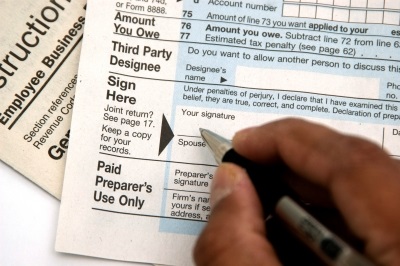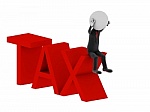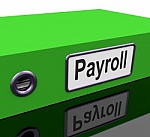College students have been using work study as a way to earn additional income for school for many years. While work study provides a regular stream of income, it is not actually classified as a job because it is a form of financial aid provided for needy students. Despite this classification, though, receiving work study income can have an impact on your federal income tax liability at the end of the year. For this reason, it's important to know why work study is significant and how to include this school related tax on your tax form.
Tax Guidelines for Work Study Employees
How to Deduct Business Travel Expenses
taxpayers are required to travel during the course of their employment. While the IRS allows individuals to write off business expenses related to travel, doing so can be a veritable minefield of tax issues, meaning you may need assistance from IRS Revenue Officers. For example, can you deduct the cost of gas if you're making a stop along the way to go sightseeing? What about engaging in pleasure while you're away on business? Is there any way to prevent being audited by the IRS for claiming travel expenses? To answer these and other questions, here's an introduction to help you learn how to write off business travel costs.
The Comprehensive Guide to Home Business Tax Payments
If you operate a home-based business, you're probably familiar with the large number of home office expenses you can deduct. However, one of the most valuable deductions available to self-employed taxpayers may also pose the highest number of tax pitfalls: the home office deduction. Due to some IRS problems with tax audits in the past, some taxpayers who are legitimately entitled to claim this deduction refrain from doing so. To be clear, people who are qualified for the home office tax deduction should use it, but they must make sure that their records and use meet the IRS guidelines.
Working for yourself can be a great way to earn a living. You may enjoy greater freedom about when and where you work or about the field in which you work. If you plan it carefully, you might even get to pick a career that you truly love. However, taxpayers who work for themselves can also fall into complicated tax scenarios, especially when they pay for costs that benefit them both personally and professionally. To avoid dealing with IRS tax audits, it's important to learn how to keep your personal and business taxes separate.
3 Tax Forms Every Self-Employed Home Business Owner Needs
Home business owners are responsible for keeping up with several income tax forms each year. Depending on the type of business they operate, these entrepreneurs may have to file many forms and schedules along with their Form 1040. Since each form carries a separate set of instructions, the thought of learning how to complete them all can be overwhelming.
Tax Tips For Hiring Seasonal Workers
If you own and operate a retail business, you might consider hiring seasonal employees to help you get through the shopping rushes in the summer and around the holidays. The good thing about using seasonal help is that you can get the assistance of a full-time employee without having to make the long-term commitment.
If you're a small business owner who is looking to hire on a few workers, you may be searching for ways to reduce your payroll budget. It's no secret that hiring employees can be costly, especially considering employers are responsible for paying federal payroll taxes, unemployment taxes, and health benefits. Some companies have used a workaround by hiring independent contractors or temporary employees, rather than full-time employees, to their workforce. While it may seem that independent contractors and temporary workers are interchangeable, they are not. The two statuses are very different, and they should be treated differently by business owners.
Tax Advice for Temporary and Seasonal Employees
Seasonal employees are workers who take jobs that only last for a few weeks or a couple of months during a specific season. Most commonly, these employees are hired on to give a business additional help during a busy period such as the summer season or the retail holiday season. In many cases, seasonal employees are students who work during school breaks or adults who are supplementing their full-time pay with part-time work. No matter their individual situations, it's important for seasonal employees to understand their tax implications so that they can avoid paying tax penalties with their returns.
The Top 5 Mistakes Independent Contractors Make
Many workers love the idea of being self-employed, but working as an independent contractor can carry its own concerns. While independent contractors are entitled deduct taxes for their businesses, they must also keep up with their own Social Security and Medicare tax payments. By the end of the year, this tax liability can cause them to incur an estimated tax penalty. Avoiding these and other important tax mistakes can help independent contractors save at tax time. Here are the top five mistakes that independent contractors make.
Payroll Tax Tips for Seasonal Business Owners
During periods of high sales activity, business owners may need to hire seasonal employees. For example, businesses that operate only during the summer, such as amusement parks, may rely on seasonal workers to handle day-to-day operations. On the other hand, year-round companies such as department stores or malls may only need seasonal workers during the holiday shopping season when revenue is at an all-time high. In either case, company owners who consider hiring seasonal employees should take care to comply with payroll tax procedures to make sure that they are following the law. Here are a few payroll pointers for seasonal business owners.
SUBSCRIBE VIA EMAIL
POSTS BY TOPIC
- Tax Tips and Help (285)
- IRS Collections (121)
- IRS Audit (72)
- Tax Credits and Deductions (70)
- Tax Resolution (62)
- Business Taxes (54)
- Back Taxes (50)
- Wage Garnishment (22)
- Tax Levies (19)
- IRS Payment Plans (15)
- Tax Liens (14)
- Offer in Compromise (9)
- Unfiled Tax Returns (9)
- IRS Tax Attorneys (7)
- Asset Seizure (6)
- Tax Evasion (6)
- Criminal Tax Defense (4)
- Innocent Spouse Relief (4)
- Alimony (1)











